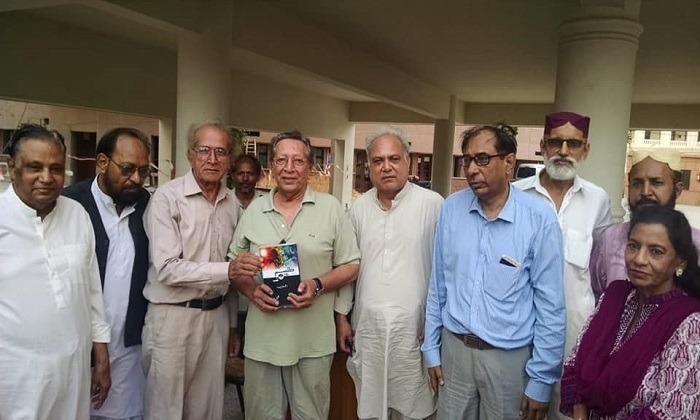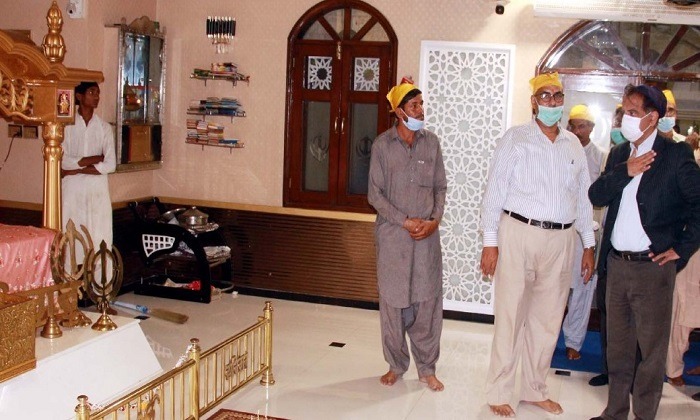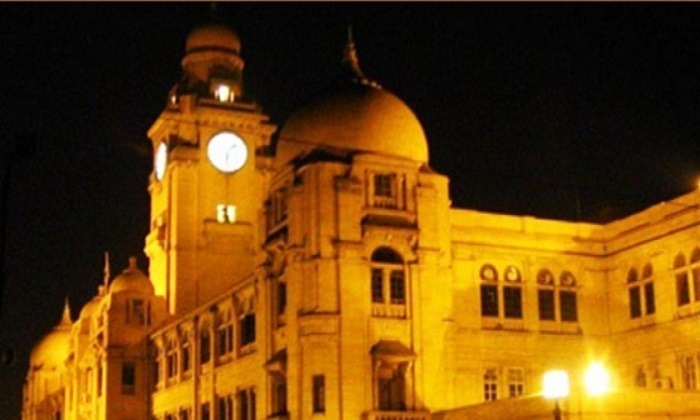[wp_ad_camp_1]Halqaa-e Arbaabe Zauq terms Hasan Javaid’s latest work as artistic
By Chronicler
Karachi
A weekly literary meeting of Halqaa-e Arbaabe Zauq (HAZ), Karachi reviewing the latest Urdu novel titled “Shehr-e-be-mehr” by an accomplished journalist and writer, Hasan Javaid termed the work as artistic and worth reading.
The meeting held at the Arts Council of Pakistan (Karachi). This is pertinent to mention here that book review on this Urdu novel titled ‘Shehr-e- Be-mehr’ was published for the first time on Pakistan Chronicle.
The participating writers and scholars analysed the novel at length and noted that it was a fresh novel enriching the Urdu fiction owing to courageous approach and creative portrayal of the characters in novel. Renowned actor and intellectual, Talat Hussain also attended the meeting as guest of honour at the meeting that was chaired by prominent poet and writer, Shakil Waheed.
Noted writer and poet Saghier Ahmed Jaffery was chief guest on the occasion. A distinguished human right activist and a representative of the publisher (called ‘Badalti Dunia’) Mr H Javed was also guest of honour at the meeting coordinated by Editor Urdu Dictionary Board Dr Shahid Zamir.
The HAZ Secretary Zaib Azkaar Hussain presented a copy of the novel titled “Shehr-e-be-mehr” to Talat Hussain, who expressed his felicitation over the publication of a worthy and creative Urdu novel on serious social issues by Hasan Javaid.
Zaib Azkaar Hussain who presented a detailed paper on the novel said this was for the first time that in his Urdu novel “Shehr-e-be-mehr”, Hasan Javaid depicted the characters working for serving the interest of ‘underworld’ in Pakistan. Besides the patriotic forces chasing the terrorists of the same underworld to foil its designs and plans, were also portrayed brilliantly.
He further held that Hasan Javaid proved his his innovative skills in creating a very good plot of his novel’s story. It was a well-knitted novel in its story and treatment of characters.
The novelist has made a good effort to capture the aims and objectives of the characters of two different and rather contradictory worlds, Hussain noted.
Zaib Azkaar Hussain pointed out the fiction of Javaid brings to light very interesting postures of life of a terrorist while differentiating him from other bad guys. He is a man of principles and does not allows his gang to abduct or harm any women and children. He is fair to other groups in dealing the affairs and his honesty and fairness makes more powerful but as happens in a traditional or conventional greek tragedy, the undefeated man lastly develops an ethical flaw (of being too proud) that causes his defeat, Hussain argued.
He highlighted that Hasan Javaidst has successfully depicted the characters and their past stories, their psyche and psychological hang-ups that eventually determined their conduct and role in a society. In other words, in order to discuss the menace of terrorism in a society.
Hussain mentioned that apparently the story of the novel exposes the crude facts and the characters behind the scenes of violation of human rights, incidents of sexual harassment and commission of crimes against children and women by developing a story. However, its undercurrents speak a lot on other dimensions of the novel’s story.
Zaib Azkaar Hussain concluded that by the characterization and depiction, Hasan Javaid has presented an in-depth study of a society facing the issue of terrorism.
According to Hussain, the short sentences and bold langue used in the novel sufficiently underlined the ‘positionings and ‘positions’ of the characters in relation to target of terrorism, victims of terrorism, unconcerned middle class families and individuals, and also groups working for the cause of peace, protection of citizens and rule of law. The novels takes into account the aims and targets and desires of different characters in the light of their mindset and approaches and according to their conditions and positions.
Zaib Azkaar Hussain pointed out the the conclusion of the novel raises a good question on the conscious struggle to meet the target of qualitative change especially in a situation when the material conditions of the society did not support the activists.
The characters working for a qualitative change still believed to work and struggle peacefully and confidently to change the society in positive terms to eventually get rid of social and psychological exploitation.
Prominent writers and scholars including Majeed Rehmani, Khalid Danish, Asif Ali Asif, Maher Jamali, Farhatullah Qureshi, Kamran Mughal, Meem Sheen Alam, Ishaque Khan Ishaque, Afzal Hazarvi , Mr Hassan Javed, Samina Hadi, Dr Aqeel Rasheed, Zaib Laasi, Dr Shahid Zamir, Saghier Ahmed Jaffery and Shakil Waheed and others were present at the meeting.
Most of the participants took part in the discussion and presented their Urdu couplets.
Talat Hussain, also presented one of his Urdu poems and later read his Urdu short story titled “Sandooq” out.
The participants of the meeting highly appreciated him for the excellent treatment and description of the story.
The symbolic revolved around the account of sufferings of a three member family; a son and his parents that migrated to Pakistan after the creation of a new country (Pakistan).
Maher Jamali presented her article on the poetry collection titled “Tilsem-e-rozo Shab” that paid rich tributes to Waheed for his fresh diction and brilliant poetic treatment. Ms Jamali was also commended for her thought-provoking article covering the creative qualities of the poetry of Shakil Waheed.
Ends



